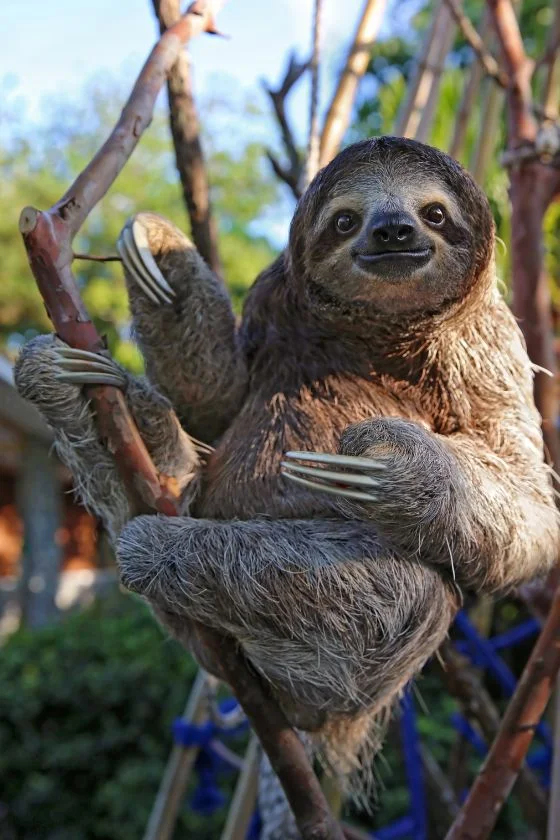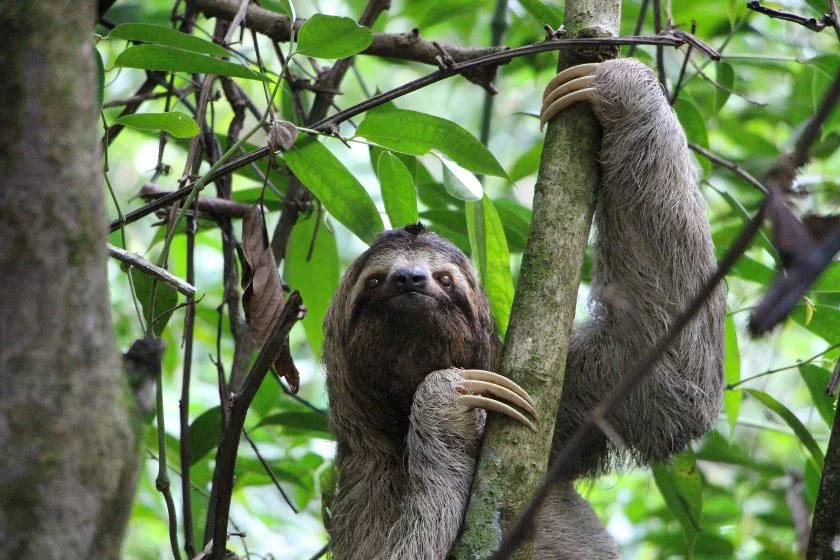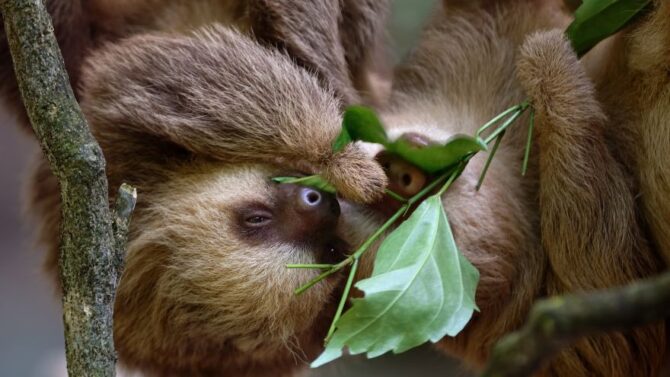“As lazy as a sloth…“
The first thing you probably ever knew about this arboreal Neotropical xenarthran mammal is its seemingly lazy habits.
This slow-moving, tree-hanging American mammal is well known for its laziness, and if you’ve ever come across a sloth, you’d know why this is true.
Sloths like to be alone—they don’t crave attention like the monkeys.
At this point, you should wonder if sloths are dangerous to humans.
Sloths are naturally calm and non-aggressive solitary animals. They don’t attack humans unless they perceive them as a threat; if agitated, they’ll fight back with their sharp nails and razor-like teeth.
Are Sloths Aggressive?

No, sloths are naturally not aggressive. Because other animals like to prey on them, they will prefer to stay in isolation to avoid predators.
Since it does not pose any threat to humans, if it perceives that you’re trying to bring harm to it, it becomes aggressive and uses its sharp nails and teeth to defend itself.
Are Sloths Dangerous?
On its own, a sloth is a very peaceful animal. We should normalize saying, “As peaceful as a sloth,” because this animal famous for hanging upside down from trees would typically not do as much as hurt a fly—they’re so lazy to do anything, what do you expect?
Now take a look at a sloth’s claw-like nails and teeth. They don’t look friendly.
That should be a constant reminder that although they appear calm and cuddly, they can also inflict significant injury if provoked.
Can Sloths Attack Humans?

Will a sloth attack humans without any provocation? Doubtfully so!
Just like many humans wouldn’t like other people invading their space, sloths also do not appreciate this.
They are not domestic animals, they belong in the wild, and because they’ve stayed there for so long, they’re not interested in forming social and emotional connections with humans.
Do not hold or touch a sloth unless you’re a vet! Why?
Because sloths are easily triggered. They sure don’t want the mushy treatments; save it for your pet dog or teddy bear instead.
Due to their “fight or flight instinct,” sloths will interpret every touch as a potential threat and invasion of their space. Because they are too slow to flee, they’d instead attack if need be.
Can a Sloth Injure You?

Do not be deceived by a sloth’s photo smile; it’s all a front. Their face lacks expressive muscles, hence the plastered smile on their faces.
Because of this endearing look on their faces, many humans will confuse this for an invitation to hug, touch, or cuddle them, but that is a bad idea!
Sloths can inflict severe injuries to any unsuspecting human that dares come close.
If you’re not trained to handle this animal, when they attack you, you might not escape without being significantly injured. Sloths are over three times stronger than the average human.
Do Sloths Like to be Touched?
No, sloths do not appreciate touching, holding, or petting. These behaviors don’t naturally accrue to them, so they’ll instead pass on them.
These animals have spent virtually all their life in the wild in isolation and away from humans.
They are not social animals, so do not expect them to enjoy you touching them.
In summary, sloths do not like human interaction except in rare cases.
According to a report, a three-toed sloth at the Pan American Conservation Society (a wildlife rehabilitation center in Gamboa) loves to be held, but only when he feels like it.
If Coquito (the Center resident star sloth) stretches out his arms for you, you can go in a hug. If it doesn’t, please stay away from it.
Unlike the three-toed sloths, a two-toed sloth is much more aggressive and would not tolerate you coming close to it.
How to Survive a Sloth Attack?
You would need to be careful out there in the wild because, who knows, there might be a sloth nearby.
To avoid or survive a sloth attack, here are some things to do:
- Look up very often: If you become negligent, you could walk towards your death. You need to look up carefully all the time because a hungry sloth might just be lurking above you.
- Don’t go out at night: If you visit the jungle during the day, you probably will find a sloth sleeping. Like owls, some sloths are nocturnal, thus, they stay awake all through the night when everyone else is sleeping. For an animal that doesn’t like socializing, that’s the best time to walk around. Do not go out in the wild at night to avoid running into this animal.
- Stay out of the water: A sloth may not be as fast as a hare on land, but it is the Usain Bolt of the water—okay, that’s exaggerated—but these animals can be fast in the water, and you don’t want to mess with them at all.
- Stop deforestation: When you cut and burn down trees that serve as food sources and a home for many sloths, you render them homeless and hungry. This becomes a problem as they will start to invade our homes and environs.
Frequently Asked Questions
How fast can a sloth attack?
This is a common question most people love to ask if they run into a sloth, but there is no straightforward answer. Although it is the slowest mammal, it can be fast to swipe at you with its claws at times you don’t even expect.
How does a sloth attack?
Sloths can bite and dig their nails into you if you come closer. Have you seen its claw-like nails before? They’re perfect for attacking and inflicting severe injuries on people and anyone or anything they suspect to be after them.
Can a sloth move fast if attacked?
No, a sloth will not run faster than it usually would, even in the face of danger. The only thing they can do to defend themselves from their predators is to attack, but sometimes when they’re not fast enough, they can get captured.
Do Sloths have a poisonous bite?
Of course not! Although a sloth’s bite is nasty, deep, and painful, it is not poisonous. However, if left untreated, it can get infected.
Do Sloths bite or scratch?
Sloths can bite and scratch. To protect itself from its assailants, a sloth will rely on its teeth (which lack an enamel covering as seen in humans) and nails to attack.
Do Sloths like to cuddle?
Sloths appear cute, friendly, and cuddly, but I wouldn’t dare hug one. A sloth is a sensitive animal, and what we term cuddling as a show of affection would be interpreted as you mishandling them.
Some sloths will want you to come in for a hug, and if you’re not too scared, go ahead but make sure an expert in sloth matters is close by
Can a sloth be a pet?
Yes, sloths can be kept as pets, but it is illegal to own a pet sloth in many states in the US. A few states still allow it, including Indiana, Kansas, Iowa, Michigan, Minnesota, Mississippi, New York, Montana, North Carolina, Nevada, Texas, and Oregon.
There are several upsides to keeping a sloth as a pet. They do not smell, and they can adapt quickly to their new environment. But is it advisable? No.
While purchasing and taking care of a pet sloth is pretty expensive, you should also consider that some sloths can be quite aggressive towards humans.
Summing Up
Most people want to get sloths as pets because of how exotic it is, but while it can be fun to have one, the downsides to keeping them as pets outweigh the upsides.
If you’ve ever believed that a sloth is friendly because of its calm looks and teddy bear features, you might want to reconsider.
These wild animals are not afraid to dig their claws into you and bite if you come close to them.
They like to be on their own and don’t care for social connections.

